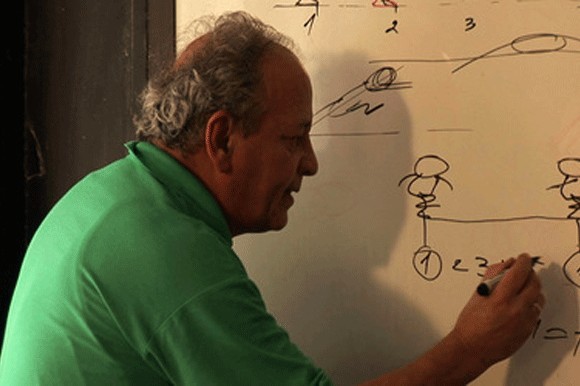Dedicated to the talented animator Antony Trayanov (the Uncle Tony of the title), the famous animated films director Donio Donev’s “right hand”, the film premiered at the Sofia autumn world film panorama Cinemania on 26 November, 2013. The screening brought strongly negative reaction from Donev’s heirs who said “the film does not respect the legitimate interests and dignity of one of the most talented Bulgarian film directors.”
“Donio Donev is perhaps the best known name of Bulgarian cinema, but he was also an informer for the Secret Service,” Mileva and Kazakova said.
“After his death my father’s memory has been violently damaged… Mileva and Kazakova should be ashamed and stop playing the roles of political victims.” Donev’s daughter Jivka Doneva replied.
The sharp conflict between the producers/directors and Donev’s family, owners of the rights over his films, excerpts of which are included in Uncle Tony… and the “express will of the heirs“ obliged Filmautor to terminate its contract with Activist 38. Meanwhile, since 7 December 2013, when the film opened in Sofia, it has been in continuous theatrical release without any restrictions.
Acting upon the claims of Activist 38, EDN and EAVE sent letters supporting Activist 38, signed respectively by Paul Pauwels and Kristina Trapp, to numerous Bulgarian institutions asking them “to stop the physical and psychological attacks, threats and mental abuse” of Mileva and Kazakova. The letters provoked immediate reactions of “profound astonishment and surprise” in Bulgaria. On their side, the Bulgarian institutions as well as individuals are now demanding the European organizations “to consider the real facts before writing”. The Bulgarians consider the situation to be much more complex than the one made public.
Ivan Pavlov, president of the Union of the Bulgarian Film Makers - Film Academy affirms that the film was never rejected from the National Academy competition as stated by Mileva and Kazakova. “On the contrary, immediately after its application the film was inscribed in the documentary section and later on, in accordance to the anonymous vote, it was nominated for best director and best sound director. Once again, in accordance to the vote, the film could not gather enough points to be nominated for best doc. The number of the votes was carefully checked by all the members of the Union’s Council”.
Boryana Mateeva, head of Programming of the Bulgarian National Film Archive gave FNE evidence that for nine weeks the film was theatrically released in the state owned “Odeon” hall, in the House of Cinema and in the Euro-Cinema, where it is still running.
The Bulgarian National Film Centre informed FNE that Activist 38 was granted financial support for development. Therefore the institution judges the producers’ statement that the “film was made without national support because the National Film Centre found the subject to be a sensitive one” as not entirely correct. In December 2013 the film was included in the main competition of the “Golden Rhyton” documentary film festival, organised by the same state institution.
Nevertheless, Mileva and Kazakova insist they are the victims of domestic institutions. ”They checked every document and agreement signed for the film,” said Mileva in relation to a tax inspection of the company in March. “As we understand it, the purpose is to ban the film before its broadcast by the BNT.”
On the other side, Boryana Mateeva, who published her article “The problem of ethics and other stories” in the Kino magazine added: “As a consequence of my observations on a manipulative approach to personalities and facts about the world famous ‘Bulgarian Animated School’ Vesela Kazakova harassed me harshly in public, holding me responsible for my opinion. Who is the victim then?” Mateeva asked.




















